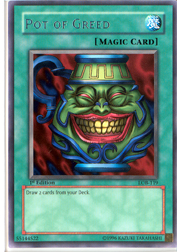What does the "T" in TCG stand for? Trading, of course! There's nothing like opening a booster pack and hoping to pull the cards you want, but when you don't get quite what you'd hoped for, chances are good that someone else did. If you happen to get the card that that person wants, you're both in luck! If you would like to expand your collection by trading, a little bit of effort on your part will set you up with the knowledge you need to get the most out of your trades.
Once you've started building a collection, you'll probably want to add to it. Trading cards with other players and collectors is a good way to exchange the cards you don't need for cards that you do. Before you start trading, there are some things to know that will make it easier. Everyone likes to get the best deal possible out of a trade, so the more informed you are, the better you will be at trading.
First of all, it's important to know about card value. A Yu-Gi-Oh! card has two kinds of value: play value and collectability value. Some cards have both, and some have one or the other. Some of the most useful cards for deckbuilding aren't ultra or secret rare. Some are even common. But since lots of players want them, they can be worth as much as less playable holo cards, and players are often willing to trade very well for them. Cards like Pot of Greed, Skill Drain, and Spirit Reaper are rares, but players put a good value on them. Many common cards, like Magical Scientist or Giant Orc, can command a good trade value. It's important to learn what decks people play in your area so that you can get an idea of what players will be willing to trade for. Learn about combos between older cards and new cards that might increase the value of cards that you might have overlooked. Magicial Scientist, for example, increased the desirability of Fusion cards like Ryu Senshi and Dark Balter the Terrible. Keeping informed of current deck ideas will help you make the most out of the cards you own.

Cards with high collectability value are cards that people like to own that aren't as in-demand for use in decks. Cards featuring popular monsters or variant artwork, or secret rares in general, usually have high collectability value. The ultimate example of cards with high collectability value is most likely the Egyptian God cards. God cards cannot be used in play, but they are cards many people like to own and display.
When determining what cards are worth to you, evaluate whether you want them for play use, or as collectibles. What use you want a card for will influence its value to you.